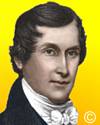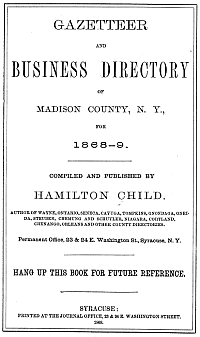 (source)
(source)
|
Canvass White
(8 Sep 1790 - 18 Dec 1834)
American civil engineer , known for his work in building canals, and who patented the first process for making hydraulic cement in the United States.
|
The Discovery of Hydraulic Cement
From Gazetteer and Business Directory of Madison County, N.Y. (1868)
The discovery of waterlime forms an interesting incident in the early history of this town [Sullivan, N.Y.]. When the construction of the Erie Canal was commenced, contracts were made to do the masonry with common lime, on account of the expense of hydraulic cement. Mason Harris and Mr. Livingstone, of Sullivan, entered into a contract to furnish a quantity for the construction of culverts, aqueducts, &c., on the middle section. They burned a large kiln and commenced delivering it, when, upon trial, it was found that it would not slack. All were greatly surprised, and Canvass White and Judge Wright, two engineers, taking an interest in the affair, examined it.
Dr. Barton, a scientific gentleman of Herkimer, was called to experiment, and, if possible, ascertain what it was. He broke a quantity in the trip hammer shop of J. B. Yates, of Chittenango, burned some, pulverized it in a mortar, and after mixing it with sand, rolled a ball and placed it in a bucket of water for the night. In the morning it had set, and was solid enough to be rolled across the floor. It was pronounced equal to the best Roman cement. It was first burned for market in log heaps, about a mile and a half west of Chittenango village. J. B. Yates fitted up a mill for grinding it.
- Science Quotes by Canvass White.
- 8 Sep - short biography, births, deaths and events on date of White's birth.
- Canvass White Obituary - from The History of Cohoes, N.Y. (1877).
- Canvass White: Civil Engineer - from Lives and Works of Civil and Military Engineers of America (1871)
- Great Engineers and Pioneers in Technology, Vol. 1, by Roland Turner and Steven L. Goulden (eds.). - book suggestion.





